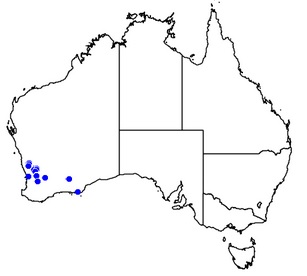Acacia cochlocarpa
Contents
General Plant Info
Sprawling shrub to 0.7 m high. Branchlets slightly flexuose, glabrous or pubescent. Stipules caducous or persistent. Grows in sand heath.
Similar to Acacia lirellata and also related to Acacia tetraneura which have narrower phyllodes, generally with fewer nerves per face.
Consists of 2 subspecies:
Acacia cochlocarpa subsp. cochlocarpa
Acacia cochlocarpa subsp. velutinosa
Geographic distribution
Occurs near Watheroo and Manmanning, south-western W.A
Identification
Phyllodes erect, narrowly oblong-elliptic, shallowly to strongly incurved, 2.5- 7.5 cm long, 3- 6 mm wide, acute or obtuse, coriaceous, glabrous or hairy on nerves, prominently 3–7-nerved, the central nerve the most pronounced.
Inflorescences simple, 2 per axil; heads sessile, subglobular to short-cylindrical, 5- 10 mm long, 5- 6 mm diam., golden; bracteoles persistent, obtuse or acute to acuminate. Flowers 4-merous; sepals c. 1/2-united.
Pods tightly spirally or irregularly coiled, with valves 3- 4 mm wide, chartaceous, glabrous or velvety.
Seeds longitudinal, round to oblong, 1.5- 2.5 mm long, glossy, mottled; aril terminal and yellowish.
Acacia cochlocarpa subsp. cochlocarpa - Branchlets, pods and phyllodes glabrous; phyllodes generally >4 cm long; flower-heads obloid to short-cylindrical
Acacia cochlocarpa subsp. velutinosa - Branchlets, pods and normally phyllode nerves hairy; phyllodes generally <4 cm long; flower-heads subglobular
